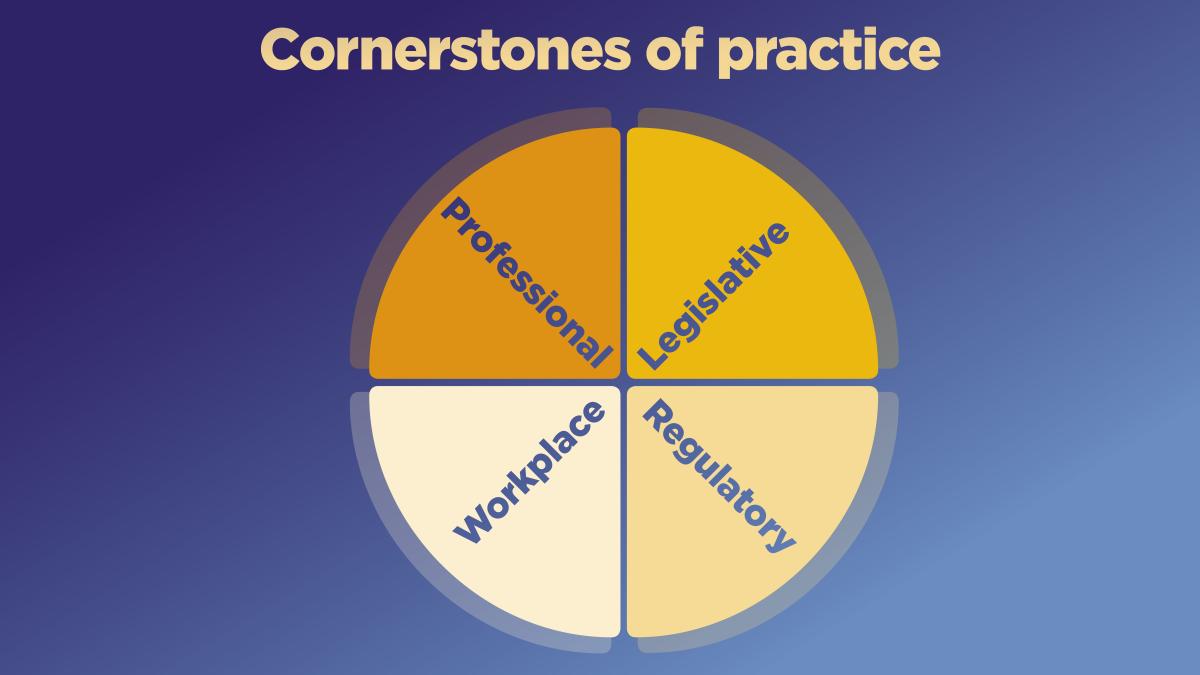Legal, regulatory and professional frameworks underpin our profession. These frameworks are useful in helping to understand scope. We have called them the cornerstones of practice. Considering each will in turn will enable you to decide whether your practice sits within the scope of the profession.

The four cornerstones are:
- Legislative – the law sets boundaries for society
- Regulatory – statutory regulators have powers to enforce the law
- Professional – the professional body defines the knowledge and skills relevant to the profession
- Workplace – contracts, job descriptions, policies and procedures
Legislative
The law of the land which overarches everything we do. We can begin to define scope by asking what the basic legal framework for the ‘practice’ being considered. The law sets the boundaries for what can and cannot be done within society and for some areas what physiotherapists can and can’t do in practice. For example, there is a legal framework around the use of medicines in physiotherapy practice and in prescribing.
Regulatory
The HCPC considers the legal and government landscape and publish guidance accordingly. Regulators have powers to impose fines or penalties, or restrict your ability to practice, so while these are closely linked to the legal quadrant, they have a more specialist focus on controlling particular parts of the law. The HCPC controls who can practise with a given protected title, and what standards that person must uphold to remain registered. This is why it is fundamentally important to know and apply HCPC requirements.
The HCPC sets standards of proficiency for the professions they regulate. Clinicians of one profession must be careful not to stray in to into offering activities that fall within the protected title of another health care profession. For example, bespoke dietary advice or standalone imaging are viewed as within the protected titles of dietician and radiographer respectively.
Professional
The CSP considers the law and regulatory requirements and interprets the impact of these for the profession in a range of advice, guidance and other services. At times, the CSP will lobby and influence the development of law (as in the case of prescribing) or secondary legislation and regulation based on its knowledge of the profession.
The CSP’s advice and guidance is designed to apply the law and regulatory requirements to specific physiotherapy scenarios to enable you to understand your responsibilities. Where there is a range of ways to apply the law or regulatory requirements, we will set out a framework to support individuals and organisations to reach appropriate decisions for their circumstances.
In this way, the CSP ensures the scope of the profession evolves appropriately and within the four pillars of practice.
Workplace
The workplace delivers activity in the context of the legal and regulatory obligations set out in contracts, job descriptions, policies, procedures and so on.
This is why advanced practitioners are able to expand their role in order to meet patient and service needs.
What falls within scope?
Considering each cornerstone in turn will enable you to decide whether your practice sits within the scope of the profession.
Further information
Download the presentation for more worked examples:
- Pilates – slide 4
- Nutrition – slide 5
- Flu vaccination – slide 6
- Spinal and caudal injections – slide 7
Understanding scope
Insurance
All physiotherapists must have appropriate indemnity (insurance cover) as a condition of their registration with the Health and Care Professions Council (HCPC).
Your CSP professional liability insurance (PLI) covers activities of physiotherapy practice that are recognised to be within the scope of profession in the UK. Exclusions include regional and local anaesthesia, acupuncture for fertility, the treatment of some professional footballers and some complementary, holistic and alternative therapies.
Separate insurance is required if you are not working within the scope of physiotherapy practice. This is often provided by your employer – for example,the NHS’s vicarious liability.



































